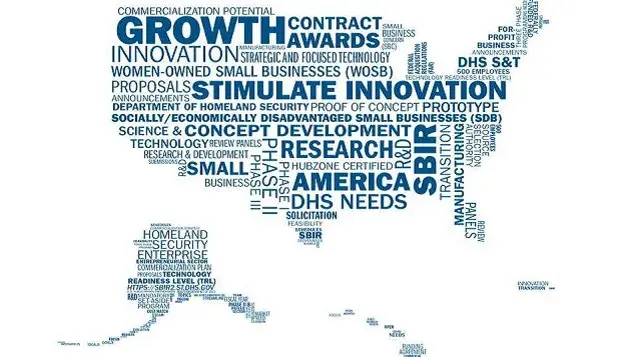The Department of Homeland Security (DHS) Science and Technology Directorate (S&T) announced the release of the Small Business Innovation Research (SBIR) Program FY15.1 Pre-Solicitation. The Pre-Solicitation, HSHQDC-15-R-00017, contains topic descriptions from both S&T and the Domestic Nuclear Detection Office (DNDO) for which Phase I proposals are sought. These include seven topics from S&T and two topics from DNDO. 
“It is important to find highly innovative solutions to the nation’s homeland security challenges,” said S&T’s SBIR Program Director Lisa Sobolewski. “America’s small business community is a font of great ideas, and we want to hear them. I encourage all eligible U.S. small businesses to submit proposals for this funding opportunity.”
The S&T topic titles are:
- DNA and Latent Fingerprint Collection from Same Sample
- Low-cost, Disposable, Tamper-Proof Bolt Seal
- Enhanced Distributed Denial of Service Defense
- Privacy Protecting Analytics for the Internet of Things
- A Wearable Communications Hub Designed to Streamline and Improve First Responder Communication Capabilities
- Total Vehicle Mobile X-Ray Scanner
- Canine Mounted Track and Transmit Device
The DNDO topic titles are:
- Mass/Shielding Anomaly Passive Detector Module
- Stable Semiconductor Modules as Core Component in Pager Radiation Detectors
The SBIR program encourages small businesses in the United States to engage in innovative research and development (R&D) to develop products or solutions that have the potential for commercialization. S&T’s SBIR topics are developed by program managers within the Directorate to close a capability gap or meet the nation’s homeland security challenges.
From December 4 through December 17, potential offerors may contact S&T’s topic authors directly for more information on their specific topics. “The pre-Solicitation contains guidance on what can and cannot be asked during this period,” Sobolewski said.
After December 17 and until January 7, 2015, offerors may submit questions to STSBIR.PROPOSALS@hq.dhs.gov. Questions must be limited to technical information related to improving the understanding of a particular topic’s requirements. “Questions seeking advice or guidance on a solution approach will not receive a response,” Sobolewski said.
Responses to pertinent questions received by 2:00 p.m. ET on January 7 will be posted on FedBizOpps.gov and the DHS SBIR Program website as an amendment to the solicitation. DHS will not respond to questions received after January 7. Phase I proposals may be submitted on or after December 18, 2014. Proposals are due no later than 2:00 p.m. ET on January 21, 2015. All offerors must submit proposals through the online proposal submission system at https://oip.dhs.gov/sbir/public.
“While we want to stimulate innovation to meet the needs of the homeland security enterprise by having offerors submit proposals that concentrate on proving the scientific and technical feasibility of their ideas, they must consider the commercialization potential of their proposed effort,” Sobolewski stressed. “We want to see the SBIR-funded technologies or products fill a gap and meet a need in the homeland security mission space. Think about the business side of things as early as Phase I,” she advised.
The SBIR Program is congressionally mandated. Eleven agencies, including DHS, administer an SBIR program. S&T’s SBIR program is focused on near-term commercialization and delivery of operational prototypes to federal, state and local emergency responders and managers, as well as internal DHS entities.
There are three phases of the SBIR process. In Phase I, awards are made to eligible small businesses to determine, to the extent possible, the scientific and technical merit and feasibility of ideas that appear to have commercial potential. According to Sobolewski, S&T will award selected offerors $100,000 for a six month Phase I effort.
At the end of six months, Phase I awardees will have an opportunity to submit their Phase II proposals to further develop work from Phase I that meets particular program needs and exhibits potential for commercial application. While S&T typically selects multiple offerors for the same topic in Phase I, historically only one Phase I awardee is selected per topic to move on to Phase II. Selected Phase II awardees will receive $750,000 over a period of two years to complete their Phase II proposed effort, which often culminates in a prototype.
It is expected that the Phase I awards resulting from this Solicitation will be made by early spring. To learn more, view the solicitation, or visit the DHS SBIR website.
